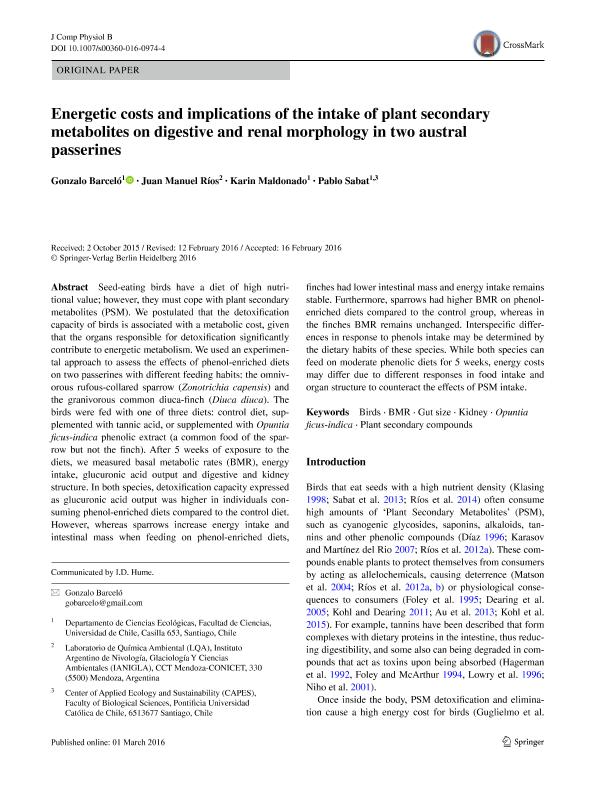Artículo
Energetic costs and implications of the intake of plant secondary metabolites on digestive and renal morphology in two austral passerines
Fecha de publicación:
07/2016
Editorial:
Springer Heidelberg
Revista:
Journal of Comparative Physiology B: Biochemical, Systems and Environmental Physiology
ISSN:
0174-1578
Idioma:
Inglés
Tipo de recurso:
Artículo publicado
Clasificación temática:
Resumen
Seed-eating birds have a diet of high nutritional value; however, they must cope with plant secondary metabolites (PSM). We postulated that the detoxification capacity of birds is associated with a metabolic cost, given that the organs responsible for detoxification significantly contribute to energetic metabolism. We used an experimental approach to assess the effects of phenol-enriched diets on two passerines with different feeding habits: the omnivorous rufous-collared sparrow (Zonotrichia capensis) and the granivorous common diuca-finch (Diuca diuca). The birds were fed with one of three diets: control diet, supplemented with tannic acid, or supplemented with Opuntia ficus-indica phenolic extract (a common food of the sparrow but not the finch). After 5 weeks of exposure to the diets, we measured basal metabolic rates (BMR), energy intake, glucuronic acid output and digestive and kidney structure. In both species, detoxification capacity expressed as glucuronic acid output was higher in individuals consuming phenol-enriched diets compared to the control diet. However, whereas sparrows increase energy intake and intestinal mass when feeding on phenol-enriched diets, finches had lower intestinal mass and energy intake remains stable. Furthermore, sparrows had higher BMR on phenol-enriched diets compared to the control group, whereas in the finches BMR remains unchanged. Interspecific differences in response to phenols intake may be determined by the dietary habits of these species. While both species can feed on moderate phenolic diets for 5 weeks, energy costs may differ due to different responses in food intake and organ structure to counteract the effects of PSM intake.
Palabras clave:
Birds
,
Bmr
,
Gut Size
,
Kidney
,
Opuntiaficus-Indica
,
Plant Secondary Compounds
Archivos asociados
Licencia
Identificadores
Colecciones
Articulos(IANIGLA)
Articulos de INST. ARG. DE NIVOLOGIA, GLACIOLOGIA Y CS. AMBIENT
Articulos de INST. ARG. DE NIVOLOGIA, GLACIOLOGIA Y CS. AMBIENT
Citación
Barceló, Gonzalo; Rios, Juan Manuel; Maldonado, Karin; Sabatino, Pablo; Energetic costs and implications of the intake of plant secondary metabolites on digestive and renal morphology in two austral passerines; Springer Heidelberg; Journal of Comparative Physiology B: Biochemical, Systems and Environmental Physiology; 186; 5; 7-2016; 625-637
Compartir
Altmétricas




